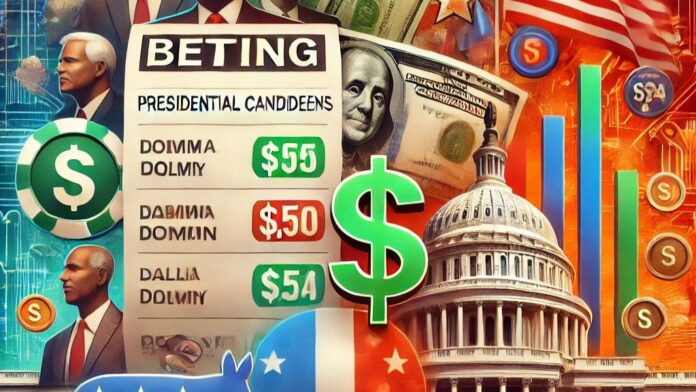The 2024 U.S. presidential election is poised to be one of the most dynamic in recent history, not only due to the candidates involved but also because of the rise of political betting markets. Platforms like Robinhood and Kalshi have revolutionized how voters and investors engage with election outcomes, creating a new landscape where financial stakes are tied to political predictions.
Robinhood, traditionally a stock trading app, has entered the election betting market, allowing users to wager on the winner of the presidential race. This platform offers a straightforward betting mechanism, where users can only bet on the eventual victor and cannot sell their positions until the election results are certified. This simplicity is designed to attract a broad audience, making it easier for casual investors and political enthusiasts to participate in this new form of engagement (Axios).
Kalshi, another prominent player in the election betting sphere, offers a more complex and diverse betting experience. Users can place bets on various political outcomes, including state-by-state results and specific electoral scenarios. Following a favorable court ruling, Kalshi has gained significant traction, becoming one of the top finance apps available for download. With over $100 million wagered on the upcoming election, Kalshi is tapping into a growing interest in political wagering that extends beyond mere speculation (Morning Brew).
The allure of betting on the 2024 election stems from the belief that these markets can provide more accurate predictions than traditional polling methods. Proponents argue that when real money is involved, bettors are incentivized to use their insights and knowledge to forecast outcomes effectively. Currently, platforms like Polymarket, which operates outside U.S. jurisdiction, have reported over $2 billion in total wagers on the election, indicating a robust appetite for political betting (Axios, Morning Brew).
However, this surge in election betting raises critical concerns. Critics argue that the potential for market manipulation exists, as large bets from single entities could skew perceptions of candidate viability. For example, reports of a $45 million wager on a Trump victory highlight the risks of distortion in market odds, which may subsequently influence public opinion and voter behavior (Morning Brew). Such scenarios pose significant questions about the integrity of democratic processes and the ethical implications of gambling on political outcomes.
Moreover, as more people engage with these betting platforms, there is a growing risk that the political process may become trivialized. Critics warn that reducing elections to mere betting opportunities can undermine the seriousness of political engagement and civic responsibility. This potential desensitization could have long-term effects on how individuals perceive and participate in the democratic process (Axios).
As the 2024 election approaches, the intersection of finance and politics through these betting markets will likely continue to evolve. With Robinhood and Kalshi at the forefront, the popularity of political wagering is expected to grow, prompting discussions about its impact on public perceptions of democracy and electoral integrity. Voters and investors alike should be aware of the potential implications of these developments as they navigate the complex landscape of modern political engagement.





